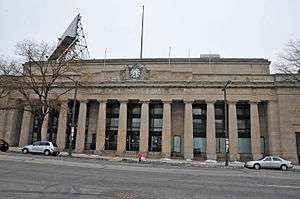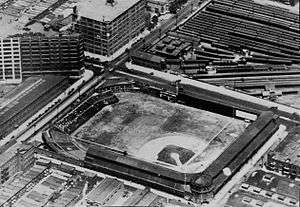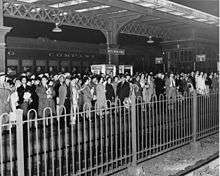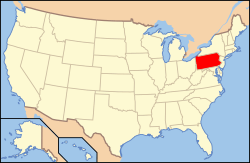North Broad station
North Broad station, known as North Broad Street until 1992, is a SEPTA Regional Rail station in Philadelphia, Pennsylvania. It is located at 2601 North Broad Street (PA 611) in the Cecil B. Moore section of Lower North Philadelphia, and serves the Lansdale/Doylestown Line and the Manayunk/Norristown Line. The station has low-level platforms on the outside tracks, with "mini-high" platforms for wheelchair and ADA accessibility.
 The former Reading Railroad North Broad station house on Broad Street. | |||||||||||||||||||||||||||||||||||||||||
| Location | 2601 North Broad Street near Lehigh Avenue Philadelphia, Pennsylvania | ||||||||||||||||||||||||||||||||||||||||
| Owned by | SEPTA | ||||||||||||||||||||||||||||||||||||||||
| Line(s) | SEPTA Main Line | ||||||||||||||||||||||||||||||||||||||||
| Platforms | 2 side platforms | ||||||||||||||||||||||||||||||||||||||||
| Tracks | 4 | ||||||||||||||||||||||||||||||||||||||||
| Connections | At North Philadelphia: Broad Street Line Local | ||||||||||||||||||||||||||||||||||||||||
| Construction | |||||||||||||||||||||||||||||||||||||||||
| Parking | Street-side | ||||||||||||||||||||||||||||||||||||||||
| Disabled access | Yes | ||||||||||||||||||||||||||||||||||||||||
| Other information | |||||||||||||||||||||||||||||||||||||||||
| Fare zone | C (Central Philadelphia) | ||||||||||||||||||||||||||||||||||||||||
| History | |||||||||||||||||||||||||||||||||||||||||
| Opened | 1929 | ||||||||||||||||||||||||||||||||||||||||
| Electrified | 1931 | ||||||||||||||||||||||||||||||||||||||||
| Traffic | |||||||||||||||||||||||||||||||||||||||||
| Passengers (2013) | 103 daily inbound boardings[1] | ||||||||||||||||||||||||||||||||||||||||
| Services | |||||||||||||||||||||||||||||||||||||||||
| |||||||||||||||||||||||||||||||||||||||||
| |||||||||||||||||||||||||||||||||||||||||
North Broad Street Station, Reading Company | |||||||||||||||||||||||||||||||||||||||||
   | |||||||||||||||||||||||||||||||||||||||||
| Location | 2601 North Broad Street Philadelphia, Pennsylvania, USA | ||||||||||||||||||||||||||||||||||||||||
| Coordinates | 39°59′32.5″N 75°9′16″W | ||||||||||||||||||||||||||||||||||||||||
| Architect | Horace Trumbauer; Irwin & Leighton | ||||||||||||||||||||||||||||||||||||||||
| Architectural style | Classical Revival | ||||||||||||||||||||||||||||||||||||||||
| NRHP reference No. | 96000325 | ||||||||||||||||||||||||||||||||||||||||
| Added to NRHP | March 28, 1996[2] | ||||||||||||||||||||||||||||||||||||||||
North Broad station is within a few blocks of the North Philadelphia SEPTA-Amtrak station (formerly belonging to the Pennsylvania Railroad), which serves Amtrak's Keystone Service and Northeast Regional and SEPTA's Trenton Line and Chestnut Hill West Line, and the North Philadelphia subway station on SEPTA's Broad Street Line.
History
Huntingdon Street station

The Pennsylvania Railroad (PRR) built the Connecting Railway in 1867 to connect its main line to the Philadelphia and Trenton Railroad. By the early 1870s, New York Junction station was established where the Connecting Railway crossed over the Philadelphia and Reading Railroad mainline in North Philadelphia.[3] By the early 1880s, the Reading established 16th Street station a block to the northwest.[4]
In 1888, the Reading announced plans to add local stations on the line, including one next to the Baker Bowl, which had opened as the home of the Philadelphia Phillies in 1887.[5] By 1891, the company offered service to Huntingdon Street station as well as 16th Street.[6] The station had two side platforms serving the line's four tracks, with a small station building facing Broad Street and Huntingdon Street.[7] 16th Street station was closed in the early 20th century.[8][9]
North Broad Street station

In 1928, facing competition from the impending completion of the Broad Street Line, the Reading decided to replace Huntingdon Street station with a larger station to rival the PRR's nearby North Philadelphia station. Groundbreaking for Broad Street station was held on July 31, 1928 and demolition of Huntingdon Street station began immediately.[10] The classical revival station, designed by Horace Trumbauer, opened as North Broad Street in 1929.[11] The station featured two island platforms which served all four tracks, connected by an underground walkway to the station, street, and the Broad Street Line's North Philadelphia station.[12] Its grand design reflected pre-Great Depression optimism and plans for redevelopment of the surrounding neighborhood.[11]
However, the Great Depression took away passengers and prevented the planned development, and the collapse of local industry after World War II further damaged the neighborhood. Ridership at the station dwindled as passengers opted for private cars or the more frequent subway. The station building was closed and sold for use as a motel in the 1960s; passengers continued to access the platforms through the pedestrian tunnel.[11] In 1981, the station was heavily damaged by fire.[11]
Railworks
%2C_September_2013.jpg)
On April 5, 1992, SEPTA began their 18-month-long RailWorks project, which included two multi-month shutdowns of the Reading mainline from Wayne Junction to Market East for emergency bridge repairs. As part of the project, North Broad Street and Temple University stations were completely rebuilt.[13] Within two weeks of the closure, demolition of the old platforms was under way.[14] The rebuilt station has two side platforms serving only the outer tracks, which were chosen to straighten the curved tracks around the former island platforms and thus allow higher speeds through the station for express trains. The pedestrian tunnel was closed and filled; access to the platforms is via ramps from North Broad Street.[15] The station, renamed as North Broad, reopened at the end of Railworks on September 5, 1993.[16]
Before RailWorks, North Broad Street served 1,200 riders per day, many of whom were transferring to the Broad Street Line or changing for one of the few trains that stopped at Temple.[17] With the addition of Regional Rail platforms at Fern Rock Transportation Center for RailWorks, substantially more service to Temple through the Center City tunnel after the conclusion of the project, and sharply reduced service due to only having two platform tracks rather than the previous four, the importance of North Broad declined significantly after RailWorks.[16] By 2001, under 300 riders used the station daily.[18]
Station building reuse
In March 1996, the station building was added to the National Register of Historic Places.[2][11] That September, Volunteers of America began a $8.3 million renovation to convert the structure into 108 housing units for people transitioning out of homeless shelters. The organization previously had used part of the first floor for adult rehabilitation and counseling programs, but the structure was so deteriorated that only 18% of the floor space was usable. The first residents moved into Station House Apartments in August 1997.[11]
Station layout
| G | Street level | Exit/entrance, buses, Broad Street Line |
| P Platform level |
Side platform | |
| Track 4 | ← Lansdale/Doylestown Line toward 30th Street Station (Temple University) ← Manayunk/Norristown Line toward Penn Medicine (Temple University) ← Fox Chase Line does not stop here | |
| Track 3 | ← Airport, Chestnut Hill East, Warminster, West Trenton lines do not stop here | |
| Track 2 | Airport, Chestnut Hill East, Warminster, West Trenton lines do not stop here → | |
| Track 1 | Manayunk/Norristown Line toward Norristown-Elm Street (Allegheny) → Lansdale/Doylestown Line toward Doylestown (Wayne Junction) → Fox Chase Line does not stop here → | |
| Side platform | ||
References
- Service Planning Department (June 2015). "Fiscal Year 2016 Annual Service Plan" (PDF). Southeastern Pennsylvania Transportation Authority.
- "National Register Information System". National Register of Historic Places. National Park Service. January 23, 2007.
- "Johnson's Philadelphia". Johnson's New Illustrated Family Atlas of the World. Alvin J. Johnson & Co. 1872 – via Ward Maps.
- "Outline Maps of the County and City of Philadelphia and Vicinity". O. W. Gray and Son. 1882 – via Ward Maps.
- "Railway Projects". Railway World. 14 (16): 376. 21 April 1888.
- "Map of Philadelphia". Rand, McNally & Co's Indexed Atlas of the World. Rand, McNally & Co. 1891 – via Ward Maps.
- "Plan 28". Baist's Property Atlas of the City and County of Philadelphia, Penna. G. William Baist. 1895 – via Ward Maps.
- "Rand, McNally & Co's Philadelphia". Rand, McNally & Co's Business Atlas and Shipper's Guide. Rand, McNally & Co. 1903 – via Ward Maps.
- "The Rand-McNally Commercial Atlas Map of Philadelphia". Rand McNally & Co's Commercial Atlas of America. Rand McNally & Co. 1916 – via Ward Maps.
- "Break Ground for Reading Company's New Station". Reading Eagle. 1 August 1928 – via Google Newspapers.
- Leobet, Deise (16 August 1997). "Ornate Station To House Homeless: Long Neglected, The Historic Building On N. Broad Is Being Remodeled. Next Month, It Will Become Apartments For 108 Men And Women". Philadelphia Inquirer. Retrieved 13 June 2016.
- Darlington, Peggy; Jones, John; Metz, George; Wright, Bob. "SEPTA Broad Street Subway". NYCSubway.org.
- Fish, Larry (5 September 1993). "Septa Is Wooing Riders Anew: Railworks Worked. Trains Are Back". Philadelphia Inquirer. Retrieved 13 June 2016.
- "RailWorks Roundup". The Delaware Valley Rail Passenger. Delaware Valley Association of Rail Passengers. 10 (5). 5 May 1992.
- "Railworks Roundup". The Delaware Valley Rail Passenger. Delaware Valley Association of Rail Passengers. 10 (7): 3. 8 July 1992.
- "Five Septa Stations To Be `Flag Stops'". The Morning Call. 3 September 1993. Retrieved 13 June 2016.
- Mitchell, Matthew (8 September 1992). "Rethink North Philadelphia Rail Stops". The Delaware Valley Rail Passenger. Delaware Valley Association of Rail Passengers. 10 (9): 13.
- "SEPTA Rider Census Full of Lessons, Trivia" (PDF). The Delaware Valley Rail Passenger. Delaware Valley Association of Rail Passengers. 20 (9): 5. September 2002.
External links
| Wikimedia Commons has media related to North Broad (SEPTA station). |

